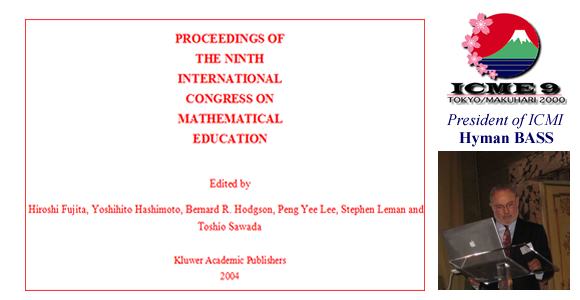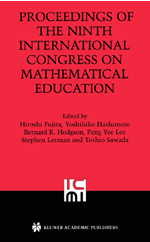 The website is in construction. New files will be uploaded as soon as they are available.
The website is in construction. New files will be uploaded as soon as they are available.
ICME-9
 |
Contents
Preface p. xi
Presidential Address at the Opening Ceremony of ICME p. xv
International Round Table: The Role of Mathematics in General Education for the 21st Century p. 2
Plenary Lectures
Hiroshi Fujita, Goals of Mathematical Education and Methodology of Applied Mathematics p. 19
Mogens Niss, Key Issues and Trends in Research on Mathematical Education p. 37
Terezinha Nunes, How Mathematics Teaching Develops Pupils' Reasoning Systems p. 58
Erich Ch. Wittman, Developing Mathematics Education in a Systemic Process p. 73
Regular lectures
Jill Adler, Widening the lens - changing the focus: Researching and describing language practices in multilingual classrooms in South Africa p. 92
Claudi Alsina, Gaudi's Ideas for Your Classroom: Geometry for Three-Dimensional Citizens p. 95
Luciana Bazzini, Cognitive Processes in Algebraic Thinking and Implications for Teaching p. 97
Jerry P. Becker, A Perspective for Teaching Elementary School Mathematics based on the Research Literature100
Alan J. Bishop. Overcoming Obstacles to the Democratisation of Mathematics Education p. 102
Margaret Brown, What Research Evidence Tells Us About Effective Mathematics Teaching for Children aged 6 - 13 p. 105
Ricardo Cantoral, A Sociocultural Approach to Infinitesimal Calculus p. 108
Megan Clark. Cultural Cross-Purposes and Expectation as Barriers to Success in Mathematics p. 111
McKenzie A. Clements, Historical Trends in Mathematics Education: Developing International Perspective p. 113
Beatriz S. D'Ambrosio, The Dilemmas of Preparing Teachers to Teach Mathematics within a Constructivist Framework p. 115
Nikolai Dolbilin, Geometry in Russian Schools: Traditions of Past and State in Present p. 118
Edward Dubinsky, Towards A Theory of Learning Advanced Mathematical Concepts p. 121
M. E. A. El Tom, On the Role of Politics in the Development of Mathematics in Africa p. 124
Joan Ferrini-Mundy, National Standards, Local Control of Curriculum: Setting the Course of Mathematics Education in the United States p. 126
Fulvia Furinghetti, Mathematics Instruction Unbound: The Contribution of Journal L'enseignement mathématique p. 128
Barbro Grevholm, Research on Student Teachers' Learning in Mathematics and Mathematics Education p. 131
Yoshihiko Hashimoto, Eliciting Mathematical Ideas from Students: Towards its Realization in Japanese Curricula p. 133
Bill Jacob, California's Back-to-Basics Policies and the 1999 Textbook Adoption p. 135
Hand Niels Jahnke, historical Sources in the Mathematics Classroom: Ideas and Experiences p. 136
Cyril Julie, Mathematical Artifact Production: Broadening the view of "Doing Mathematics" p. 139
Constance Kamii, Primary Arithmetic Based on Piaget's Constructivism p. 142
Alexander Karp, Exams in Mathematics (secondary schools) - Russian Experience: Traditions, Changes, Difficulties p. 144
John Kenelly and Dan Warner, When Machines Do Mathematics, then What do Mathematics Teachers Teach? p. 146
Goetz Krummheuer, Narrative Elements in Mathematical Argumentations in Primary Education p. 148
Oh-Nam Kwon, The Role of Personal Computing Technology in Mathematics Education: Today and Tomorrow p. 151
Colette Laborde, New Technologies as a Bridge between Various Parts of Mathematics for Pre-service Students Teachers p. 153
Ewa Lakoma, History of Mathematics in Educational Research and Mathematics Teaching - The Case of Probability and Statistics p. 155
Stephen Lerman, The Socio-cultural Turn in Studying the Teaching and Learning of Mathematics p. 157
Frederick K. S. Leung, In Search of an East Asian Identity in Mathematics Education - The Legacy of an Old Culture and the Impact of Modern Technology p. 159
Li Chuan Zhong and Zhang Jing Zhong, Automated Reasoning and Educational Intelligent Platform p. 162
Shiqi Li, Does Practice Make Perfect? p. 165
Lim-Teo Suat Khoh, Enhancing the Mathematical Knowledge of Primary Teachers p. 168
Claire Margolinas, Modeling the Teacher's Situation in the Classroom p. 171
Tatsuro Miwa, Crucial Issues in Teaching of Symbolic Expressions p. 174
David K. J. Mtetwa, Mentoring in Mathematics Teaching and Teacher Preparation in Zimbawe p. 177
Huynh Mui, Computer Science and Toward an Approach in Research on Mathematical Education p. 179
Yukihiko Namikawa, Can College Mathematics in Japan Survive? A Project of Reform p. 181
Jarmila Novotna, Student's Levels of Understanding Word Problems p. 184
Iman Osta, Teaching Geometry in a Changing World p. 186
Han Shick Park, Mathematics for Mathematics Teachers - On Statistics p. 188
Han Sakonidis, Mathematics Education for and in the Dominant and Other Cultures: A Multicultural Inquiry p. 190
Hyunyong Shin and Inki Han, Mathematics Education for Gifted Students in Korea p. 192
R. Soedjadi, Designing Instruction of Values in School Mathematics p. 195
Osamu Takenouchi, some Characteristic Features of Wasan: The Japanese Traditional Mathematics p. 197
Peter Taylor and Nathalie Sinclair, Reinventing the Teacher: the Teacher as Student; the Teacher as Scholar; the Teacher as Teacher p. 200
Dina Tirosh, Ruth Stavy and Pessia Tsamir, The Intuitive Rules Theory: Comparison Situations and Infinite Processes p. 203
Lieven Verschaffel, Real-World Knowledge and the Modelling of School Word Problems p. 205
Shlomo Vinner, Mathematics Education - Procedures, Rituals and Man's Search for Meaning p. 207
Catherine P. Vistro-Yu, Children's Understanding of Basic Measurement Concept: A Cultural Perspective p. 210
Shangzhi Wang and Qixiao ye, Mathematical Modelling in Middle School Education of China p. 212
Walter Whiteley, Visual Forms in Mathematics: Thinking, Communicating, Learning p. 213
Kiyoshi Yokochi, Mathematics Instruction through the Production of Manipulative Materials p. 216
Working Groups for Action p. 219
WGA 1: Mathematics Education in Pre- and Primary School p. 220
WGA 2: Mathematics Education in Junior Secondary School p. 226
WGA 3: Mathematics Education in Senior Secondary Schools p. 232
WGA 4: Mathematics Education in Two-Year Colleges and Other Tertiary Institutions p. 238
WGA 5: Mathematics Education in Universities p. 243
WGA 6: Adult and Life-long Education in Mathematics p. 248
WGA 7: The Professional Pre- and In-service Education of Mathematics Teachers p. 253
WGA 8: Research, Practice and Theory of Mathematics Education p. 258
WGA 9: Communication and Language in Mathematics Education p. 264
WGA 10: Assessment in Mathematics Education p. 270
WGA 11: The Use of Technology in Mathematics Education (Computers, Calculators. IT Media) p. 273
WGA 12: The Social and Political Dimensions of Mathematics Education p. 278
WGA 13: History and Culture in Mathematics Education p. 287

Topic Study Groups p. 292
TSG 1: The Teaching and Learning of Algebra p. 293
TSG 2: The Teaching and Learning of Geometry p. 297
TSG 3: The Teaching and Learning of Calculus p. 300
TSG 4: The Teaching and Learning of Statistics p. 303
TSG 5: Teaching and Learning Aids and Materials (Hands-on) in Mathematics Education p. 307
TSG 6: Distance Learning in Mathematics Education p. 309
TSG 7: The Use of Multimedia in Mathematics Education p. 313
TSG 8: Vocational Mathematics Education p. 316
TSG 9: Mathematical Modelling and Links between Mathematics and Other Subjects p. 319
TSG 10: Trends in Mathematics and Mathematical Sciences: Their Reflections on Mathematics Education p. 323
TSG 11: Problem Solving in Mathematics Education p. 325
TSG 12: Proof and Proving in Mathematics Education p. 325
TSG 13: Mathematical Learning and Cognitive Processes p. 331
TSG 14: Constructivism in Mathematics Education p. 335
TSG 15: Mathematics Education for Students with Special Needs p. 339
TSG 16: Creativity in Mathematics Education and the Education of Gifted Students p. 343
TSG 17: Mathematics Education and Equity p. 347
TSG 18: Mathematics competitions in Mathematics Education p. 350
TSG 19: Entrance Examinations and Public Examinations in Mathematics Education p. 352
TSG 20: Art and Mathematics Education p. 354
TSG 21: Ethnomathematics p. 357
TSG 22: Topics in Mathematics Education in Asian Countries p. 361
TSG 23: TIMSS and comparative Studies in Mathematics Education p. 365
Presentation by Distribution at WGAs TSGs p. 370
ICMI Studies p. 371
Summary Report of the ICMI Study: The Teaching and Learning of Mathematics at University Level p. 372
The Role of History of Mathematics in the Teaching and Learning of Mathematics: Presentation of the ICMI Study and the Study Book p. 374
Affiliated Study Groups p. 378
History of Mathematics at ICME 9 p. 379
International Organization of Women and Mathematics Education p. 380
Psychology of Mathematics Education at ICME 9 p. 386
Report on WFNMC Meeting p. 384
The forum of all Chinese Mathematics Education at ICME 9 p. 386
Secretary General's Closing Remarks (Bernard R. Hodgson) p. 391
List of Participants p. 401
Notes
Parts of the papers are available on http://books.google.com. Participants were about 2300 from more than 70 countries. In his closing remarks, the Secretary General observes that a great part of grant funds for non-affluent countries comes from individual domestic donations, the majority of these from persons not participating in ICME 9 but wishing to support mathematics education.
One volume, format about 23 cm x 15 cm; xviii + 434 pages, with CD-Rom.
